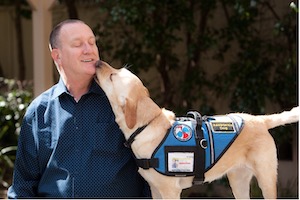Posted 1 December 2022

Sadly, it is predicted that this number will more than double by 2050, unless there is a medical breakthrough.
To date, there are no drugs that effectively treat Alzheimer’s.
This is in part because of a lack of knowledge of what causes it – the type of knowledge that could change the life of someone like Phil Hazell, who was diagnosed with early onset Alzheimer’s when he was just 55.
“Often when I was out, I’d forget the meal I’d ordered and couldn’t remember a small round of drinks for friends. I was forgetting things around the house and found it hard to follow a recipe to make a meal.”
Now 63, Phil does his best to maintain a full life, with the support of his wife Jan. Sadly, his support dog Sara (pictured above) has recently passed away.
Phil travels regularly, advocates for younger-onset dementia via social media on Twitter, does speaking engagements and recently finished four years as Chair of the Dementia Australia Advisory Committee.
“In a perfect world, there would be screening tests for Alzheimer’s, so that people can be prepared and set up the supports they might need. In an even more perfect world, there would be treatments to drastically slow down or prevent Alzheimer’s from developing in the first place.”
HELP MAKE PHIL’S DREAM COME TRUE
Professor Michael Parker has the same hopes and vision for Alzheimer’s treatments as Phil.
“We are investigating how the power of specialised immune cells in the brain, called microglia, can be harnessed as a treatment for Alzheimer’s disease,” Michael says.
While microglia make up only a small percentage of the cells in the brain, they are thought to support its healthy functioning by removing dying neurons and toxic proteins.
Michael and his team aim to stimulate the activity of microglia using a compound that binds to a particular protein on their surface. It is thought this protein acts like a handbrake on the microglia, slowing down its ability to clear toxins. The drugs they are developing are designed to release that handbrake.
Preliminary results indicate that the new drugs being developed can enhance the removal of brain toxins, without the negative consequences that have plagued other drug trials.
We ask that you please give generously this Christmas, so SVI can continue to fight for a cure to Alzheimer’s and other diseases that affect thousands of Australians every day.
YOUR DONATION COULD HELP US MAKE THE NEXT ALZHEIMER’S BREAKTHROUGH